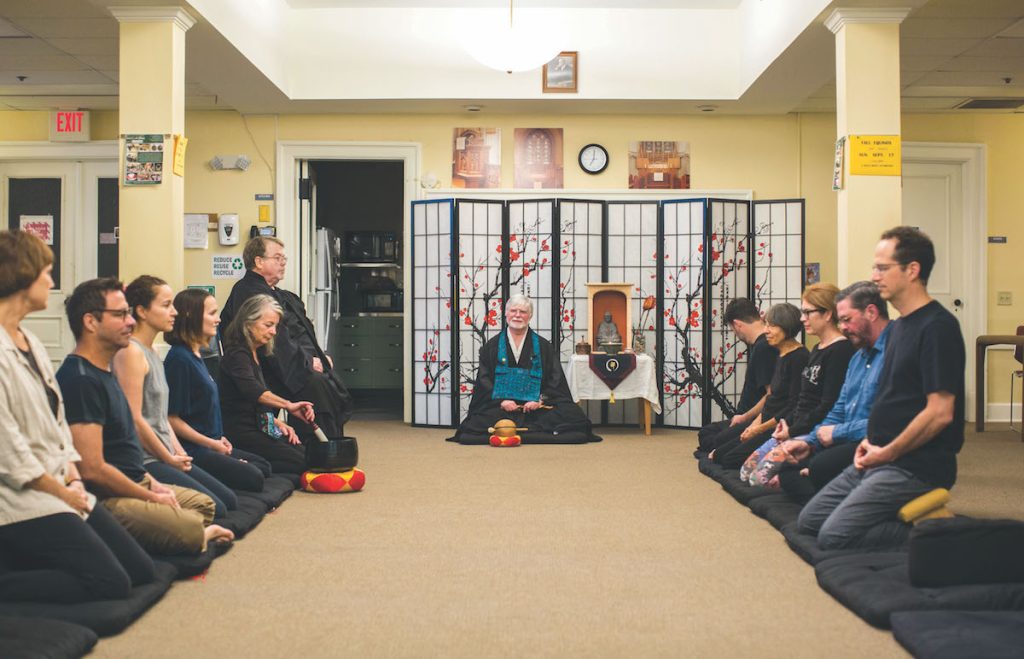City: Lancaster, Pennsylvania
Tradition: Zen (White Plum Asanga; Zen Peacemakers Sangha)
Year Founded: 1993
Number of Members: 25
Meeting Place: Basement of the Unitarian Universalist Church of Lancaster
Tricycle talks to Edward Sangetsu Sullivan, Sensei, Red Rose Sangha’s resident teacher:
Your sangha is in Lancaster, Pennsylvania, which is home to a large Amish community. What is life like in Amish Country? Lancaster is an interesting juxtaposition of modernity and the 18th century. As you walk downtown, you see lawyers rushing to court and the Amish unloading their wares to sell “at Market”—the country’s oldest farmers’market, at Penn Square—where you’re just as likely to hear English or Pennsylvania Dutch spoken. Families travel in traditional black horse-and-buggy carriages, and the local Costco has hitching posts. “The English,” as we are known, live in a very different world. Ours is a culture that embraces modern conveniences, unlike the Amish culture, which largely rejects technology. So our primary interaction is through commerce, usually involving farming and construction. The Amish are renowned for their carpentry skills and often own or are hired by construction companies to build houses.
Do you ever share Amish pies at the sangha? We have too many vegans! We’ve served traditional dishes like Shoofly (molasses) pies, though they’re made with eggs, so some of our members avoid them. Unfortunately, they are also delicious, so I rarely pass up a slice.
How did the sangha start? The group was started by a professor at Franklin & Marshall College. Initially it was attended by college kids, and then the group began to attract some community members. The college kids eventually graduated, and then it was pretty much the community members who were left. I founded Red Rose Sangha proper because I was teaching at the school where this group was meeting. I went one night, liked the people, and never left. For a while, we were a floating zendo, but that’s not the best way to grow a sangha. One of our members approached her church and they welcomed us with open arms, and then we finally had a place to have our service every Sunday night.
What is the significance of “Red Rose” in your name? Lancaster City is referred to as the Red Rose City. It got that name from the War of the Roses, which was fought in the 15th century between the two houses competing for the English throne: Lancaster and York. The badge of the House of Lancaster was a red rose; the badge of the House of York was a white rose. One county over from us is a town called York, which is known as the White Rose City. We think that “Red Rose Sangha” sounds more interesting than “Zen Community of Lancaster.”
You meet in the basement of a church. How has this shaped your sangha? When we started we drew a number of congregants from the Unitarian Universalist Church—it was a big step when we made it into the church bulletin! They were curious and came to check us out, and some of them even came back and kept coming, so that’s how we initially started to grow our sangha from a relatively small group. Now we are a diverse group of practitioners. Many of the people who come to Red Rose for the first time come with some meditation experience: some have trained in the Vajrayana tradition, others in Theravada or Zen. And some have never meditated before, so we never know who’s going to walk in the door and what their background will be. And you don’t have to be a Buddhist to sit with us, either. My first Zen teachers were retired Catholic nuns! The good news about Zen is that it emphasizes experience over dogma. Like the Buddha suggested, we invite you to come see if what we offer squares with your experience, and if it does, great, and if not, well, that’s fine too.
How is the group maintained? Do you have official members? We have a saying at our sangha: “If you come once, you’re a member. If you come three times, we’ll make you an elder.” [Laughs.] So I suppose you could say that we’re relaxed and informal. We don’t pay rent, so that simplifies things. Every January we collect donations that we offer to the church to express our gratitude, and then we’ll designate another month for collections for a scholarship fund that helps support people to attend a retreat with other sanghas and teachers.
I’m guessing you don’t have any Amish practitioners at the sangha, but does any aspect of their faith inspire your Zen practice? You’re right, we don’t have any Amish Zen practitioners. However, several members of our sangha can trace back their families to Mennonites and Quakers. What inspires me the most about the Amish is their deeply spiritual sense of community. At the Red Rose Sangha, we typically end our sittings with a recitation of the three refuges: I take refuge in the Buddha, the dharma, and the sangha. Like the “Plain people”—a term sometimes used to refer to the Amish— we support our members when they need help. When there’s an ailing member of our community, for instance, we’ll coordinate visits for a group meditation, chanting, and a reading. After that we’ll just sit and chat. We see our sangha as a community and a refuge.
♦
Tricycle wants to learn about your sangha! Write news@tricycle.org to be considered.
Thank you for subscribing to Tricycle! As a nonprofit, we depend on readers like you to keep Buddhist teachings and practices widely available.
